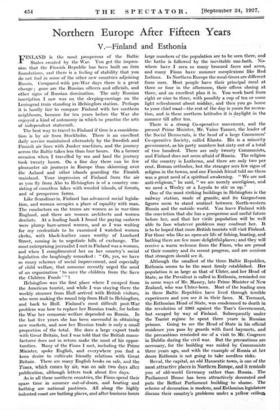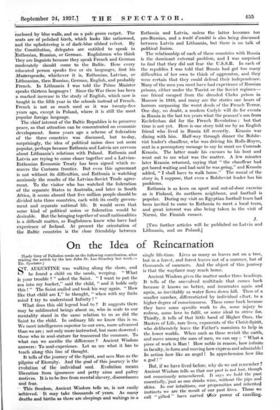Northern Europe After Fifteen Years
V.—Finland and Esthonia
FINLAND is the most prosperous of the Baltic States created by the War. You get the impres- sion that the Finnish Republic has been built on firm foundations, and there is a feeling of stability that you do not find in some of the other new countries adjoining Russia. Compared with pre-War days there is a great change ; gone are the Russian officers and officials, and other signs of Russian domination. The only Russian inscription I saw was on the sleeping-carriage on the Leningrad train standing in Helsingfors station. Perhaps it is hardly fair to compare Finland with her southern neighbours, because for ten years before the War she enjoyed a kind of autonomy in which to practise the arts of independent statecraft.
The best way to travel to Finland if time is a considera- tion is by air from Stockholm. There is an excellent daily service maintained alternately by the Swedish and Finnish air lines with Junker machines, and the journey across the Baltic takes less than four hours. On a former occasion when I travelled by sea and land the journey took twenty hours. On a fine day there can be few pleasanter air journeys in Europe than skimming over the Aaland and other islands guarding the Finnish mainland. Your impression of Finland from the air as you fly from Abo to Helsingfors is of a country con- sisting of countless lakes with wooded islands, of forests, and of prosperous farms.
Like Scandinavia, Finland has advanced social legisla- tion, and woman occupies a place of equality with man. The conductors on the trams are women as in war-time England, and there are women architects and women dentists. At a leading bank I found the paying cashiers were plump bare-armed women, and as I was waiting for my credentials to be examined I watched women clerks, with black-leather cases worthy of Lombard Street, coming in to negotiate bills of exchange. The most enterprising journalist I met in Finland was a woman, and when I complimented her on her country's social legislation she laughingly remarked : " Oh, yes, we have so many schemes of social improvement, and especially of child welfare, that someone recently urged the need of an organization ' to save the children from the Save the Children Funds ' I Helsingfors was the first place where I escaped from the American tourist, and while I was staying there the weekly steamer from Hull arrived with British visitors, who were making the round trip from Hull to Helsingfors, and back to Hull. Finland's most difficult post-War problem was how to replace her Russian trade, for before the War her economic welfare depended on Russia. In the last five years she has been successful in obtaining new markets, and now her Russian trade is only a small proportion of the total. She does a large export trade with Great Britain, but I was told that the British manu- facturer does not in return make the most of his oppor- tunities. Many of the Finns I met, including the Prime Minister, spoke English, and everywhere you find a keen desire to cultivate friendly relations with Great Britain. There are many English books on sale, and the Times, which comes by air, was on sale two days after publication, although letters took about five days.
As in all these northern countries, the Finns spend their spare time in summer out-of-doors, and boating and bathing are national pastimes. All along the highly indented coast are bathing places, and after business hours large numbers of the population are to be seen there, and the bathe is followed by the inevitable sun-bath. No- where have I seen so many bronzed faces and arms, and many Finns have summer complexions like Red Indians. In Northern Europe the meal-times are different from ours. Most people have their principal meal at three or four in the afternoon, their offices closing at three, and an excellent plan it is. You work hard from eight or nine to three, with possibly a cup of tea or some light refreshment about midday, and then you go home to your chief meal—the rest of the day is yours for recrea- tion, and in these northern latitudes it is daylight in the summer till after ten.
There is a strong Co-operative movement, and the present Prime Minister, Mr. Vaino Tanner, the leader of the Social Democrats, is the head of a large Consumers' Co-operative Society, called Elanto. His is a minority government, as his party numbers but sixty out of a total of two hundred. There are only twenty Communists, and Finland does not seem afraid of Russia. The religion of the country is Lutheran, and there are only two per cent. Roman orthodox, but the stranger sees few signs. of religion in the towns, and one Finnish friend told me there was a great need of a spiritual awakening. " We are not anti-religious," he said, " we are merely unreligious, and we need a Wesley or a Loyola to stir us up."
One of the most striking buildings in Helsingfors is the railway station, made of granite, and its Gargantuan res seem to stand sentinel between North-western Russia and the outside world. You leave Finland with the conviction that she has a prosperous and useful future before her, and that her virile population will be well able to face whatever problems may confront her. It is to be hoped that more British tourists will visit Finland.
For those who like an open-air life of fishing, boating, and bathing there are few more delightful places; and they will receive a warm welcome from the Finns, who are proud of their country and its recent progress, and are anxious that strangers should see it.
Although the smallest of the three Baltic Republics, Esthonia seems to be the most firmly established. Her population is as large as that of Ulster, and her Head of State, as the President is called in Esthonia, reminded me in some ways of Mr. Massey, late Prime Minister of New Zealand, who was Ulster-born. Most of the leading men in these Baltic Republics have lived through terrible experiences and you see it in their faces. M. Teemant, the Esthonian Head of State, was condemned to death in the revolution of 1905 against the Tsar's Government, but escaped by way of Finland. Subsequently under the Tsarist regime he spent three years in Russian prisons. Going to see the Head of State in his official residence you pass by guards with fixed bayonets, and the precautions reminded me of a visit to Mr. Cosgrave in Dublin during the civil war. But the precautions are necessary, for the building was raided by Communists three years ago, and with the example of Russia at her doors Esthonia is not going to take needless risks.
Reval, the capital, an old Hanseatic town, is one of the most attractive places in Northern Europe, and it reminds you of old-world Germany rather than. Russia. The Parliament House has been attractively decorated and puts the Belfast Parliament building to shame. The scheme of decoration is modern, and Esthonian legislators discuss • their country's problems under a yellow ceiling, enclosed by blue.walls, and on a pale green carpet. The seats are of polished birch, which looks like satinwood, and the upholstering is of dark-blue ribbed velvet. By the Constitution, delegates are entitled to speak in sthonian, Russian, or German. Englishmen who think they are linguists because they speak French and German moderately should come to the Baltic. Here every educated person speaks five or six languages, first his llfuttersprache, whichever it is, Esthonian, Latvian, or Lithuanian, then Russian, German, English, and probably French. In Lithuania I was told the Prime Minister speaks thirteen languages ! Since the War there has been a marked increase in the study of English, which now is taught in the fifth year in the schools instead of French. French is not as much used as it was twenty-five years ago, except in Poland, where it is still the most popular foreign language.
The chief interest of the Baltic Republics is to preserve peace, so that attention can be concentrated on economic development. Some years ago a scheme of federation of the three countries was discussed, but to-day, surprisingly, the idea of political union does not seem popular, perhaps because Esthonia and Latvia are nervous about Lithuania's relations with Poland. Esthonia and Latvia are trying to come closer together and a Latvian- Esthonian Economic Treaty has been signed which re- moves the Customs frontier. But even this agreement is not without its difficulties, and Esthonia is watching anxiously the results of the Latvian-Soviet Trade agree- ment. To the visitor who has watched the federation of the separate States in Australia, and later in South Africa, it seems absurd that five million people should be divided into three countries, each with its costly govern- ment and separate national life. It would seem that some kind of political union or federation would be desirable. But the bringing together of small nationalities is a difficult matter, as Englishmen know who have had experience of Ireland. At present the orientation of the Baltic countries is the close friendship between Esthonia and Latvia, unless the latter becomes too pro-Russian, and a traite d'amitie is also being discussed between Latvia and Lithuania, but there is no talk of political fusion.
The relationship of each of these countries with Russia is the dominant external problem, and I was surprised to find that they did not fear the U.S.S.R. In each of the republics I was told that Russia had got too many difficulties of her own to think of aggression, and they were certain that they could defend their independence. Many of the men you meet have had experience of Russian prisons, either under the Tsarist or the Soviet regimes— one friend escaped from the dreaded Cheka prison in Moscow in 1918, and many are the stories one hears of horrors surpassing the worst deeds of the French Terror. One day, no doubt, a modern Carlyle will do for events in Russia in the last ten years what the peasant's son from Ecclefechan did for the French Revolution ; but that time is not yet. Here is one story told me by an English friend who lived in Russia till recently. Krassin was dining with him. Half-way through dinner the Bolshe- vist leader's chauffeur, who was driving his Rolls-Royce, sent in a peremptory message to say he must see Comrade Krassin. The latter made his excuses to his host and went out to see what was the matter. A few minutes later Krassin returned, saying that " the chauffeur had got bored waiting and had said he was going," and Krassin added, " I shall have to walk home." The moral of the story is, I suppose, that even a Bolshevist leader has his problems.
Esthonia is as keen on sport and out-of-door exercise as is Finland, its northern neighbour, and football is popular. During my visit an Egyptian football team had been invited to come to Esthonia to meet a local team, and great interest was also being taken in the visit of Nurmi, the Finnish runner.
J. [Two further articles will be published on Latvia and Lithuania, and on Poland.]











































 Previous page
Previous page